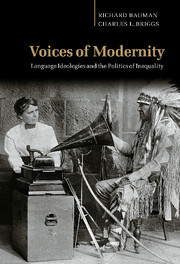Book contents
- Frontmatter
- Contents
- Preface
- 1 Introduction
- 2 Making language and making it safe for science and society: from Francis Bacon to John Locke
- 3 Creating modernity's others in seventeenth- and eighteenth-century England: antiquarian and philological inflections
- 4 The critical foundations of national epic and the rhetoric of authenticity: Hugh Blair and the Ossian controversy
- 5 Language, poetry, and Volk in eighteenth-century Germany: Johann Gottfried Herder's construction of tradition
- 6 Scientizing textual production in the service of the nation: the Brothers Grimm and Germanic philology
- 7 The making of an American textual tradition: Henry Rowe Schoolcraft's Indian researches
- 8 The foundation of all future researches: Franz Boas's cosmopolitan charter for anthropology
- 9 Conclusion
- References
- Index
6 - Scientizing textual production in the service of the nation: the Brothers Grimm and Germanic philology
Published online by Cambridge University Press: 22 September 2009
- Frontmatter
- Contents
- Preface
- 1 Introduction
- 2 Making language and making it safe for science and society: from Francis Bacon to John Locke
- 3 Creating modernity's others in seventeenth- and eighteenth-century England: antiquarian and philological inflections
- 4 The critical foundations of national epic and the rhetoric of authenticity: Hugh Blair and the Ossian controversy
- 5 Language, poetry, and Volk in eighteenth-century Germany: Johann Gottfried Herder's construction of tradition
- 6 Scientizing textual production in the service of the nation: the Brothers Grimm and Germanic philology
- 7 The making of an American textual tradition: Henry Rowe Schoolcraft's Indian researches
- 8 The foundation of all future researches: Franz Boas's cosmopolitan charter for anthropology
- 9 Conclusion
- References
- Index
Summary
Herder shook the linguistic foundations of the modernist project laid out by Locke. Herder sought to undermine the purifying practices that Locke had used to construct language as an autonomous domain, to sever its links to society and tradition. For Herder, not only was language intrinsically social, but linguistic differences and commonalities provided the prime means of defining families, communities, regions, and nations. While a purified language formed, for Locke, an obligatory passage point along the road to modernity, Herder saw modernity as a threat to language, potentially depriving it of social, political, and affective force. While Locke saw tradition, which he deemed to be extraneous to language, as a key source of social servitude, error, epistemological uncertainty, and, ultimately, conflict, Herder regarded it as the source of social order and political strength. At the same time that Locke's program for language was based on a universalistic rationality, Herder sought to reprovincialize language, asking it to give up cosmopolitan claims to universality, to transcend indexical claims to identities, communities, places, and times.
Even in the heyday of romantic nationalism, however, Locke's linguistic modernity did not simply go away. Herder thus presented modern subjects with something of a dilemma. As for Locke, language provided him with a key means of defining modernity. And language ideologies and practices played a crucial role in the very different modernity that Herder sought to construct, one that peopled territories with national citizens and the globe with nation-states, as Benedict Anderson (1991) suggests.
- Type
- Chapter
- Information
- Voices of ModernityLanguage Ideologies and the Politics of Inequality, pp. 197 - 225Publisher: Cambridge University PressPrint publication year: 2003
- 1
- Cited by

